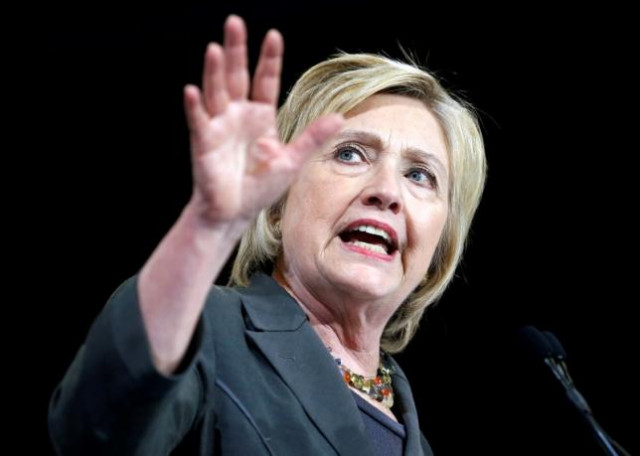Clinton attacks Trump's outreach to black voters in new ad
The Democrat asks voters to reject the "bigotry" of Donald Trump's White House campaign

In targeting what she terms Trump's bigotry, Clinton hopes to remind voters of controversial statements he has made over the course of the campaign. PHOTO: REUTERS.
The ad shows video of Trump's controversial pitch to black voters, in which the Republican candidate urges them to support him by asking, "What do you have to lose?" It also shows headlines about a racial discrimination lawsuit the New York real estate mogul faced in the 1970s.
Clinton tops 50% support from US voters in latest poll
Clinton's presidential campaign said the ad, released a day after she gave a speech accusing Trump of fueling America's "radical fringe," would air in the hotly contested states of Florida, North Carolina, Ohio and Pennsylvania.
Her campaign also said on Friday that President Barack Obama will appear in Pennsylvania on Sept. 13 to promote her candidacy.
Clinton followed up her tough speech by saying on Friday that Trump's temperament and divisiveness made him unfit for the White House.
"I am reaching out to everyone, Republicans, Democrats, independents, everyone who is as troubled as I am by the bigotry and divisiveness of Donald Trump's campaign," she told MSNBC, adding she was asking "fair-minded Americans to repudiate this kind of divisive demagoguery" at the Nov. 8 election.
FBI documents investigating Clinton viewed in secure areas of US Capitol
Clinton delivered the speech in the middle of a difficult week for her campaign, as the release of new emails from her time as secretary of state revived criticism of her decision to use a private address and server rather than a government one.
The emails also stoked scrutiny of her family's charitable foundation, including accusations that major corporate and foreign donors gave money in hopes of securing more access to then-Secretary Clinton. Her campaign says no donors received any special favors.
Republican National Committee spokesman Sean Spicer told MSNBC Clinton was only talking about Trump and race this week to deflect attention from that controversy.
Trump countered her rhetoric on Friday by releasing a video showing Clinton in the 1990s discussing a crime bill and referring to "super-predators," or at-risk youth she said needed to be brought under control. The video also shows U.S. Senator Bernie Sanders, Clinton's main opponent in the Democratic primary this year, calling that phrase a "racist term."
Controversial Statements
In targeting what she terms Trump's bigotry, Clinton hopes to remind voters of controversial statements he has made over the course of the campaign. Those include describing some Mexican immigrants as criminals and rapists, suggesting a judge could not be fair because of his Mexican-American heritage, and proposing a temporary ban on Muslim immigration to combat terrorism.
Trump slams Clinton's 'more of the same, but worse' in first ad
Trump has tried to sidestep these dust-ups by saying Democrats have failed minorities with their economic policies. On the campaign trail, Trump has begun asking what black voters have to lose by supporting him, saying they are living in poverty and attending failing schools.
Jennifer Hochschild, a professor at Harvard University who focuses on race and immigration, said she did not think Trump could fix his relationship with black and Hispanic voters.
"General cluelessness about racial dynamics will diminish any possible black support that comes from Trump's emphasis on job creation," Hochschild said in an email. "And Clinton has a lot of deep roots among black politicians."
Trump also has been criticized for vowing to deport millions of people living in the United States illegally. In recent days, he had appeared to hold out the possibility of toning down his hardline stance, although his precise plans on immigration have been harder to pin down.
On Thursday, he denied he would loosen his proposed immigration restrictions.
"I don't think it's a softening," Trump told CNN. "I've had many people say it's a hardening, actually." He said he was still weighing what would become of the 11 million people already in the country illegally.



















COMMENTS
Comments are moderated and generally will be posted if they are on-topic and not abusive.
For more information, please see our Comments FAQ